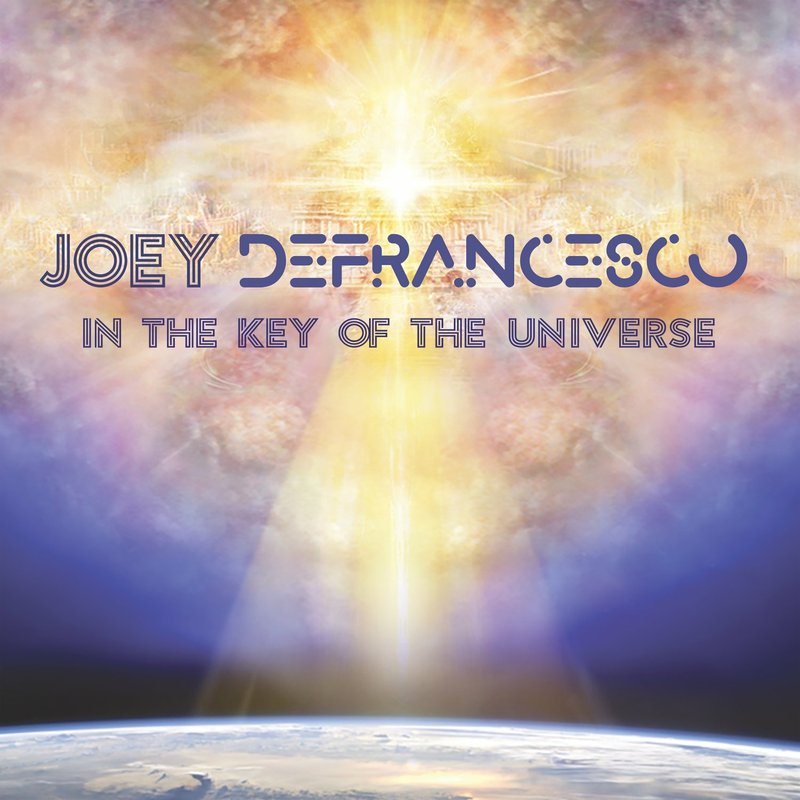A Joey DeFrancesco
In the Key of the Universe
Mack Avenue
Leave it to Philadelphia's lion of the Hammond B-3 organ to bring soul and innovation to jazz's most ignored solo instrument. The onetime Miles Davis band member spent 2018 in the company of Van Morrison with several bluesy albums of backing sessions (e.g. The Prophet Speaks), and one where he and Van the Man shared title credit for collaboration, You're Driving Me Crazy.
On his latest, the organist finds his head in the clouds and his inner vision focused on the astral planes of free jazz — a unique place to roam, considering his usual guttural grooves of smoldering blue jazz.
With fellow cosmos-dwelling drummer Billy Hart and saxophonist Troy Roberts, DeFrancesco maintains a love of spacious harmony as a composer, and each player solos his rear end off on "Awake and Blissed" and "Inner Being." Funky and free, "It Swung Wide Open" is an aptly titled epic in which Hart gets his chance to shine brightest and bash hardest. Still, nothing is so impressive as the meeting between DeFrancesco's oozing, open organ tones and the living master of jazz's spirited saxophonist, Pharaoh Sanders. Then there is the match-up between Sanders' doleful reed sound and DeFrancesco's doubling on trumpet and organ on "And So It Is," where each giant step between them acts like a cross between a dueling lovers' quarrel and a chattily conversational tea party.
Hot tracks: "And So It Is," "Awake and Blissed," "It Swung Wide Open"
— A.D. AMOROSI
The Philadelphia Inquirer (TNS)
B+ Son Volt
Union
Transmit Sound/Thirty Tigers
Jay Farrar is not happy with the state of our country. Union, the ninth Son Volt album, contains titles such as "Truth to Power Blues," "Lady Liberty" and "Broadsides," and it was recorded in part at the Woody Guthrie Center in Oklahoma and the Mother Jones Museum in Illinois. Although the songs include character portraits (of laborers, immigrants and whistle-blowers) and attacks on corrupt values, many of them are calls to action. "Take a stand now, protest and holler/ Desecration of the land for the almighty dollar," Farrar sings in "The 99" (as the percent that waits forever in the "trickle-down world"). "There must be hope in this hell/ And we fiddle while Rome burns," he sings in "While Rome Burns."
The last two Son Volt albums have focused on roadhouse country and blues, and Union contains trace elements of those genres, but it mostly sounds like a Son Volt album: a blend of world-weary ballads and rolling rock songs anchored by Farrar's relaxed baritone. Over his career, Farrar has tended to work changes on similar melodies, but the direct, earnest politics and the well-crafted storytelling keep Union from sounding too familiar.
Hot tracks: "The 99," "Truth to Power Blues," "Lady Liberty"
— STEVE KLINGE
The Philadelphia Inquirer (TNS)
SINGLES

• Lil Uzi Vert, "Free Uzi." Recently, Lil Uzi Vert announced online that his career was on hold, if not over. What appeared to be a disagreement with his label seemed to be imperiling the release of any new music, including the long-awaited album Eternal Atake. However, there has been some movement amid the uncertainty. "Free Uzi" — which his label said was not an official release — made its way to SoundCloud and YouTube, displaying Uzi at his frenetic best: rapping about a woman "back on my team/ 'cause my neck wet like a squeegee"; alluding to problems with his finances; and confessing to watching The Big Bang Theory.
— JON CARAMANICA
The New York Times
• Pink, "Hustle." This song couldn't bang any more bluntly; it's three minutes of tightly packed pop escalation. "Don't hustle me," Pink berates a guy who "took my love/ mistook it for weakness." Then she restates the line with a blunter word that radio stations and this newspaper won't use. The swinging beat harks back to rockabilly, and so does Pink's belted-with-a-grin vocal, but the production expects a minuscule 21st-century attention span, springing a new sound — hand claps, backup voices, gunshots, bell tones, synthetic horns — every four bars if not sooner. It's as meticulous as it is brash.
— JON PARELES
The New York Times
• Betty Carter, "If I Should Lose You." Betty Carter was jazz's quintessential modernist: She liked to tease and stretch a classic melody until it was almost misshapen, testing her elastic instinct against the structure of a piece. In this live recording, captured at Lincoln Center in 1992 during the heady final years of her career, Carter sings "If I Should Lose You" in duet with the young pianist Geri Allen. The accompanist treats the song with her own sense of passionate restraint, collapsing its harmonies at the center, as if to represent the song's fraught, nearly fatalist romanticism. The concert has just been released on CD by Blue Engine Records, Jazz at Lincoln Center's in-house label.
— GIOVANNI RUSSONELLO
The New York Times
Style on 04/09/2019
